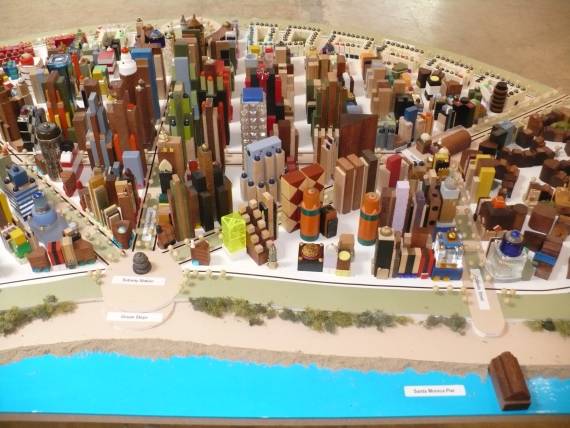
(Streetsblog Los Angeles, L.A. Walks and Place It! are competing for your vote for an #la2050 grant to bring a Vision Zero street safety campaign to Los Angeles. James Rojas, Place It’s founder, explains why his interactive planning model is key to helping people realize what Vision Zero would mean to their day to day lives. If you’re not familiar with Rojas’ modeling projects,check out this video by Dr. Pop Vote for us, here, and encourage your friends to do the same.- DN)
Los Angeles, and Santa Monica, streets are inherently spatial and experiential.
For the public, the streets are places shaped by emotions, memories, uses, experiences, and desires. Streets are a physical place of reactions, and a mental space of imagination. Through L.A. Vision Zero Workshops participants set out to capture that emotional connection with the streets to help develop projects, plans, and polices to make them safer.
These workshops make it possible to engage this spatiality in rich and subtle ways that aren’t possible in other urban planning tools. Maps, words, numbers, and computer models are excellent at capturing various aspects of streets, but necessarily do so in an abstracted way. The simple exercise provides a visual language that everyone can participate in regardless of typical barriers such as language, age, ethnicity and professional training.

As people build their ideal street, new ideas and opportunities emerge that weren’t visible at the beginning. People are freed from the roles, biases and preconceptions they came with and were able to explore their ideas collectively. This process allows people to physically engage with the street in a direct way, with their bodies and hands, changing their viewpoint and posture, focusing and standing back, touching and changing things.
Creative expression can help begin the process to help create safer streets in L.A. These workshops are an art “process” that creates a new meaningful urban planning form of engagement, communication, problem solving, and data collection. The four creative practices of Imagination, Investigation, Construction and Reflection, are the strategy behind the workshops:
- IMAGINE – the street
- INVESTIGATE – the street
- CONSTRUCT – the street
- REFLECT – on the street
The public becomes the artist and can explore, develop, make mistakes, and represent their ideas by constructing their ideal city through temporal models using thousands of found objects. The community discovers together solutions and their ideas are quickly validated in the planning for safer L.A. streets.
